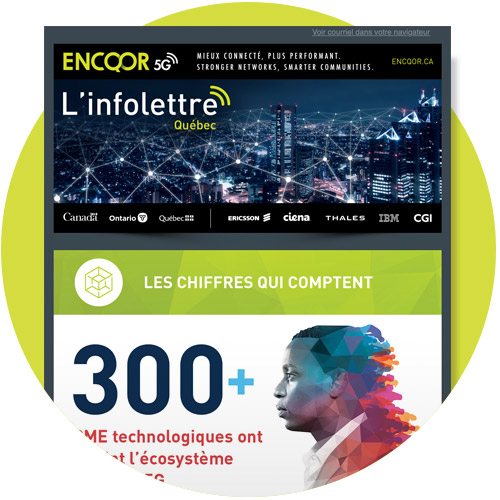IoT devices profiling in 5G networks
5G (ENCQOR) Technology Development Challenge
IoT devices profiling in 5G networks

Challenge Launch Date
May 15th, 2019
Challenge Deadline
July 28, 2019 (This call for projects has expired. Notices of interest are no longer accepted.)
Challenge Statement
With the exponential emergence of the Internet-of-Things (IoT), IoT devices security is gaining momentum. More specifically, with the democratization of highly available connected networks like 5G, the number of the devices is more likely to be astronomic. Several vendors, distinguished in many business cases, are planning to put on production cellular connected IoT devices, opening the door for several security breaches that can be exploited by potential attacks. We propose to develop innovative approaches to ensure IoT devices monitoring, profiling and enforcement in 5G networks. These mechanisms are to develop a set of innovative solutions for defending core network and internet from potential threats originating from IoT devices deployed at the edge.
Project Partner
Ericsson Canada Inc.
Timeline
3 years
Available funding
$150,000 CAD (50,000 per year, renewable every year)
Applicant Type
Quebec based College/University
Location
Montreal is the main hub, though the research and development can be completed remotely with scheduled online meetings and face-to-face workshops.
Project Details
In this proposal, we aim at elaborating a system that allows to automatically identify and profile IoT devices from the generated traffic. The main challenge addressed in this research is to conduct features engineering on 5G premises to build a machine learning based profiling system for IoT devices, to frame the normal behavior of IoT devices. Based on the learning, the system will be able to identify misbehaving IoT devices and provide symptomatic indicators for security analysts to drive a root cause analysis.
We formulate the objectives to be fulfilled as:
- Elaboration of different deployment of IoT devices in 5G environment, where different use cases can be defined as well as underlying simulated/emulated attacks to build a strong ground truth for profiling.
- A robust study on different features to be considered in 5G networks to profile IoT devices, considering both bare metal and virtualized (NFV, SDN, container based and ONAP) environments. The study will include identification of different sources of data (logs, net flows, etc.), as well as a thorough attribute analysis to identify important features to consider for profiling tasks.
- A study of different machine learning/ artificial intelligence artifacts to be used on the profiling of IoT devices, including a comparison between solutions in terms of complexity, accuracy, as well as the ability to provide strong evidences to drive root cause analysis of security problems.
We plan for the project to culminate in usable profiling and analytics support prototype, as a detective security control for IoT devices deployments in 5G networks.
Deliverables:
Note that in the proposal, the deliverables should be detailed into yearly results to be achieved for the project.
- Reports including:
o A report on deployments of IOT devices in 5G networks: this will include different use cases, which span over both bare metal and virtual environments.
o A report on data sources, data collection tools that help to leverage information as a ground truth for IoT devices behavior.
o Features engineering: surveying different attributes from the literature as well as their applicability in 5G deployments. o ML/AI artifacts: surveying different approaches to profile IoT devices, including complexity analysis in terms of data processing, training, testing, response time and memory overhead. o A report on offensive security on IoT devices deployments to generate misbehavior ground truth to test the profiler. - Academic papers:
o A survey paper that leverages information collected from research reports.
o Research papers describing how the profiling is achieved and subsequent results. - Proof of Concept:
o Develop a proof of concept to profile IoT devices in 5G networks, and a security control to detect malicious behavior of IoT devices.
This challenge is strategically important for the development of the industry and the ENCQOR consortium since it:
- Supports the development of a 5G security awareness mechanism, which helps to support a secure deployment of cellular connected IoT devices.
- Provides a testbed to identify cyber-threats that may impact 5G through IoT devices, as well as testing potential methods to detect them through a profiling technique.
- Builds a strong knowledge and competence with respect to 5G and IoTs security in the Canadian academia.
Project Goals/Outcomes
- Identification of different cellular IoT devices deployment scenarios with an emphasis on the ones, where security is a big concern.
- Analysis of potential sources of data to identify features that can help to create a ground truth for IoT devices profiles. The goal of this task is to find assets that need to be monitored on 5G premises.
- Demonstrate how leveraged data will help to profile IoT devices on a 5G testbed. The profiles will correspond to a baseline behavior that describes the interaction between IoT devices and 5G network.
- Drive experiments on IoT devices to generate deviation from normal behaviors and validate if the profiling approach enables detection.
- A proof of concept to integrate all mentioned components, which helps to profile IoT devices and detect their misbehavior.
Applicant Capabilities
- 2 researchers (M.Sc. or PhD level)
- Strong background in wireless communications and 5G.
- Experience in IoT devices, networks deployment, network orchestration, data analytics, machine learning and offensive security.
- Hands-on experience on data mining, machine learning, artificial intelligence APIs (Scientific Kilt learn, Tensorflow, Keras, etc.) as well as deployment of security-oriented dashboards, including both the back-end (NoSQL databases) and front-end (Kibana, Grafana).
Additional Information
- It should be noted that Ericsson Canada solutions are proprietary of potential patented and trade secrets. Academic applicants must be willing to work under a Non-Disclosure Agreement (NDA) with Ericsson.
- Ericsson is open to a possible NSERC CRD project based on this funding.

